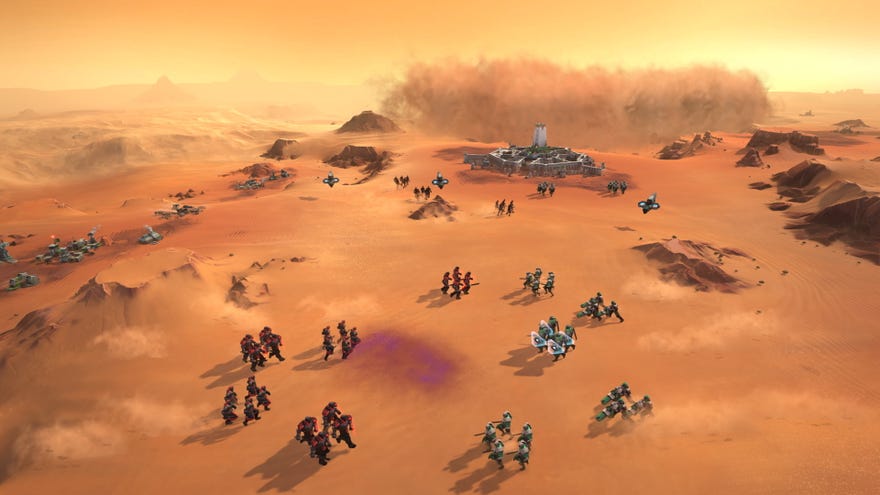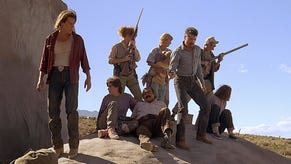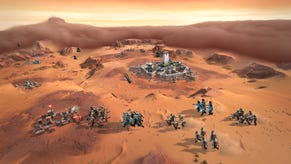Dune: Spice Wars gets back to basics with its compelling mix of 4X ambition and real-time strategy
Shiro Games didn't even have to use the special voice, either...
Easily one of the standout PC reveals from last year's Game Awards, Dune: Spice Wars is an upcoming real-time 4X strategy game about everyone's favourite doomed sand planet. Based on Frank Herbert's acclaimed novel and made by the same folks behind Northgard and Wartales, Dune: Spice Wars will see players step into the boots of one of four factions when it launches in early access later this spring, and I've had a chance to see how one of them works in action.
In a hands-off presentation, developers Shiro Games showed us how the (sadly Chalamet-less) Atreides family will be going about their fight to control Arrakis' most coveted substance - the all-important spice melange - although players will also be able to choose from the shady Harkonnen clan at launch, plus two more unannounced factions that will be revealed in the coming weeks. There's a lot to take in, but if you've been waiting for a Dune game to succeed the 1992 RTS epic that was Dune II: Battle For Arrakis, well, you better pull your head out of the sand and strap on your hydro-cycling stillsuit. The battle for this year's best strategy game is about to get spicy.
You'll start a game of Spice Wars from your base fortress of Arrakeen - the big, stony megacity you may remember getting spectacularly zapped to smithereens in Denis Villeneuve's 2021 film adaptation. Fortunately, you'll have more time to bed into this version of Arrakis' capital, as unlike said film (and the books), you're pretty much starting your spice empire from scratch here, rather than walking into an established operation as the latest steward. Arrakeen is surrounded by a thick fog of war when the game begins, and you'll need to push out with your dragonfly-esque Ornithopters to discover new spice fields and nearby villages to set up your facilities in.
These are initially shown as just points of interests on your map, and you'll need to spend time scouting these locations before their true nature is revealed. Shiro Games says these points of interest can be all manner of things, from the aforementioned villages to ruins, wreckages and caravans, all of which will grant you specific bonuses. Before you can start harvesting nearby spice fields, however, you'll need to take control of its nearest village, either by sending over some of your military units to take it by force or, since we're playing as the peace-loving Atreides in this demo, by engaging in a bit of diplomacy. The former gets you the village faster, and for some factions (*cough* the sluggy Harkonnens *cough*) it's the only option. However, going down the more diplomatic route will get you the added bonus of already having two raiders in place to defend your new territory.
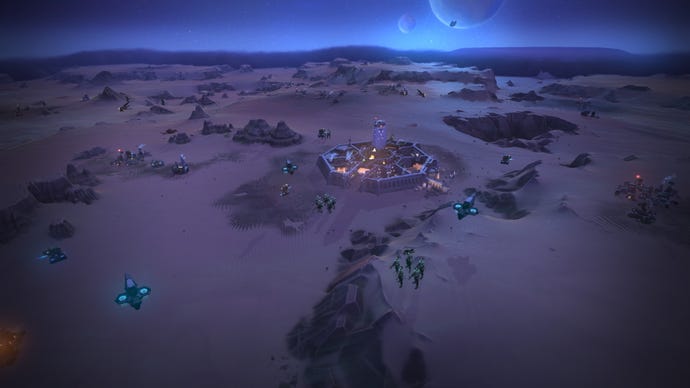
Shiro Games were feeling a little more aggressive during our demo, and as their squad of foot soldiers approached, they were greeted by the village's own military representatives. When two sides met, it was guns up and blood on the sand. Unlike other RTS games you may be familiar with, ranged units don't automatically place themselves out of harm's way in Dune: Spice Wars, so you'll need to micro-manage your troops if you want them to come out of a scuffle unscathed. Units can get pretty miniscule when the camera's zoomed out, but I found the gunners' silhouettes were just about distinguishable from the other melee-based warriors, and the added unit banner above their heads helped pick them out even further - although quite how this will scale with larger armies remains to be seen. On the plus side, at least you only have to click on one of them to select the entire unit.
"Dune: Spice Wars definitely is a 4X game," Shiro Games' head of marketing and publishing Adrien Briatta told us. "It has a slow rhythm, a tile system, a lot of resources, but it remains an RTS at heart - and this aspect is especially important during combat."
Once you emerge victorious, it's time to properly capture the village. You'll still need enough authority in the region to actually take control of it, I should note, but you can check this stat before engaging in any fight by hovering over the village with your mouse. Once you've captured a village, you can starting building your spice refineries and begin harvesting.
The rest of your resources and political currency can be found in the top nav bar. As "the most important resource", your Spice level is nice and large in the UI, and next to it you'll find a slider you can set to either sell it to the Choam for cash (or solari, in the game's parlance), or stockpile it for future use. The latter is "super important," says Briatta, as each month you'll have to pay the dreaded spice tax to your imperial overlords. This tax will vary as time progresses, and if you find yourself unable to pay then your Landsraad Standing will fall accordingly, making you an easier target for political attacks, which Briatta says "can be as destructive as military ones".
Fortunately, selling spice isn't the only way to earn solari. You can also get cash by getting dividends from the Choam and trading resources with other players, and you'll need some sizable quantities of it for putting down buildings and raising your armies. You'll also need to manage your Plascrete, another important construction material that you'll need to build a special factory for before you can start producing it, and your Manpower, which determines how many citizens you have to train as soldiers and man vehicles.
You won't get any of that done, though, if you don't have enough water, which "will be a huge issue for you," warns Briatta. It's effectively your stability meter. If you don't have water, villages will rebel, potentially causing your entire empire to collapse beneath you. Fortunately, you can produce water by constructing different buildings such as wind traps, but you can also find it in the North Bowl, a region in the far corner of the map that's "a very important place in the game," says Briatta. "There will be a race to the North Bowl," he continues, as it allows you to build a lot of important resources to help you get ahead.
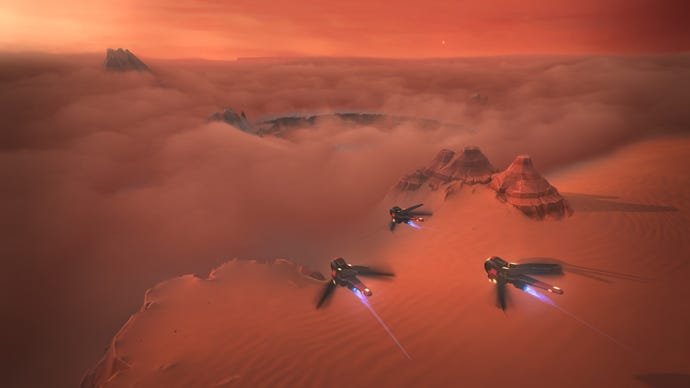
In an ornithopter, it's only a very short jaunt to the North Bowl, but getting your units there and defending it will be another matter entirely. There are sections of Arrakis known as 'deep desert', you see, and units will pretty much die instantly if they try to cross it on foot - something Briatta ominously refers to as "the desert price". Units have to dig into their supplies whenever you go outside your territory, you see, and once supplies are depleted, they'll start losing health. Due to the exceptionally high winds in deep desert territories, this process happens even faster, and we all watched in horror as lead game designer Franck Delfortrie sent a group of troopers in to demonstrate. "Deep deserts can be considered as seas in other 4X games," Briatta explains, and you'll need better technology to cross them.
To aid transportation (and develop your empire more generally), you'll need to continuously work away at Spice Wars' tech tree. It's roughly split into four main categories: expansion, military, economics and statecraft, which covers all things politic and subterfuge. In our presentation, selecting 'Survival Training' in the Military section unlocked a new heavy weapons unit for the Atreides family, but each faction will have their own unique squads to play with. Each unit also comes with their own special passive abilities as well, which Briatta says have been designed to complement one another in battle. To demonstrate this he explained how the Atreides rangers can deal splash damage from afar, while the Atreides troopers can get stronger when they lose health - which they will inevitably do when in range of their rangers' attacks. It's a slightly risky strategy, I'll admit, but I'll be intrigued to see how other units play off each other in the final version.
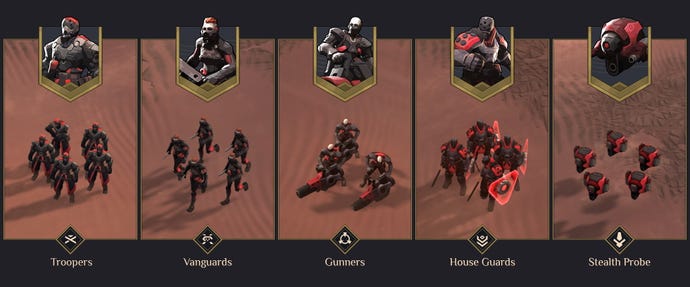
It's not just the North Bowl you'll need to defend, either. Arrakeen and your other conquered settlements will also need protection as you explore and conquer more of the map. As the capital city, Arrakeen's self defence systems should be able to see off potshots from small groups of desert raiders, but mobilising your troops to defend villages and refineries will require a lot more unit micro-management. There's also your main enemy faction to worry about as well. In my presentation, it was the Harkonnens sitting on the other side of the Spice Wars table, although the brief nature of this particular demo meant we never got to see whether they'll be able to wreak equally cinematic destruction as their filmic counterparts.
That said, even if you have the best army on Arrakis, you'll still need to play politics with the Landsraad Council to keep everyone on side. This is all done through a panel on the right-hand side of the screen, although Briatta said its UI is still being worked on and may change when it hits early access. Still, from what I saw, it all looked reasonably manageable. The most important stat to keep on top of is your Landsraad Standing, which is determined based on your relationship with other factions and whether you've been paying that aforementioned spice tax. However, you can also use subterfuge to affect it as well, which in turn will affect how much impact you have when trying to pass resolutions.
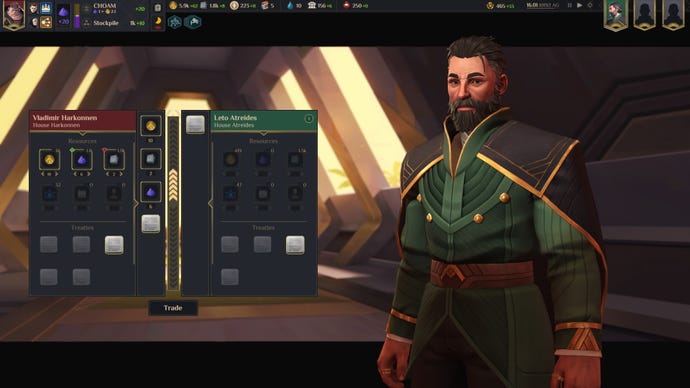
The resolutions I saw available during the demo included validating new infrastructure (increasing the building cost of the elected faction), signing new military contracts to increase an army's power, or de-escalating tense situations. You can elect yourself or your opponent for any of these resolutions, and you spend votes to try and pass them. You can also use your influence to sway the outcome in your favour as well. This can be determined by your main Authority stat, or by using intelligence gained through espionage - and that includes using agents to spy on institutions such as the council in addition to other factions. You'll need to gather intel before you can send your spies to do your dirty work, though, which you can gather in ruins and wreckages. In short, it looks like you'll have plenty to think about during the course of a game, which Briatta reckons should last between 3-5 hours - although quite how often you'll need to engage with Spice Wars' politicking instead of moving your armies round the map remains to be seen.
Indeed, the Landsraad Council isn't all there is to this side of the game. There's also a separate diplomacy screen you can access by clicking on your opposing faction's portrait. If you're feeling generous, you can send them resources such as solari, spice and plascrete, and you can also get them to sign treaties in exchange for those resources. I particularly liked how changing the trade offering in our presentation altered the reaction of head slug boy Baron Harkoneen. His wrinkly quadruple chins practically doubled when presented with a bad trade deal, but he blessed us with a cocked brow and a rubbing of his grubby little hands when we revised it to something more appealing. As slimy as Baron Harkoneen might be in last year's film, engaging in this may help turn him into more of a friend during your campaign, and he may even lend you his support in the Landsraad Council as well.
To win a game of Dune: Spice Wars, most players will likely achieve a victory of Hegemony, which is represented as a kind of overall game score that goes up as you gradually build and expand your empire. There are also diplomatic victories to be had, where you can effectively elect yourself to become the governor of Arrakis through the Landsraad Council (although Briatta says this is quite difficult to pull off successfully), or you can take everything by force through a military victory - and that includes using your spy network to assassinate your opposing faction leader. This is another "very difficult" victory to achieve according to Briatta, but let's face it, it does sound a lot more fun than being Baron Harkonnen's best bud. You won't find me climbing in a big black slime bath with that guy, no sir.
Whichever way you decide to go about it, though, this early access build of Dune: Spice Wars looks like it will have plenty of plates to keep spinning, and I, for one, am excited to dig into it all myself. Based on what I've seen, it looks like Shiro Games have done a fine job of translating Dune's big epic power plays into a real-time 4X strategy game, and most importantly, it doesn't look overly intimidating for first-time players to the genre, either. There's a lot to take in, for sure, but as someone who's always been a bit frightened of tackling some of the all-time 4X greats, Dune: Spice Wars definitely looks more my kind of speed - and a 3-5 hour game length isn't half bad either. There's still no word on exactly when Spice Wars will be heading to early access on Steam just yet, but we'll keep you posted as soon as we hear more.
